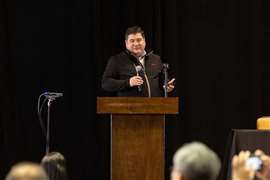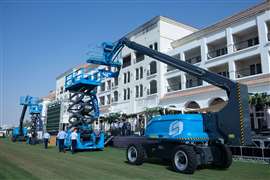Simplex refocuses: Lindsey Anderson talks to CEO André Véronneau.
03 February 2014

André Véronneau, long-standing CEO of Montreal-based Simplex Equipment Rental, tells Lindsey Anderson about the challenges of working in modern-day Quebec and why the company is refocusing its business on aerial platforms and industrial forklifts.
Rental businesses have all sorts of challenges, but one of the more unusual is that facing rental companies in Quebec, Canada, where there has been a very public problem of organised crime infiltrating the construction business.
It is alleged that Quebec contractors took part in a scheme to rig the bids on public work projects, with organised crime getting pay-offs from winning contractors. The issue is now the subject of an extensive government enquiry, the Charbonneau Commission.
“The general enquiry to look at all construction activity – the infiltration of organised crime in construction – has been going on for 18 months now,” says André Véronneau, CEO of Simplex Equipment Rental, the largest independent rental company in Canada and known in Montreal primarily under its French name, Location d'outils Simplex.
“It has slowed down demand, especially in Montreal, because that’s where it started. Everyone is nervous. It isn’t clean. It’s big and it’s hurting the market.”
The commission’s work is still in progress, so for Simplex and others who are reliant on construction, it is a matter of simply getting on with business as best they can.
In the case of Simplex it has plenty more on its plate, primarily an ambitious plan to extend its market share in the aerial platform and forklift rental sectors in Quebec by opening 20 new locations in the next two years.
“We want to concentrate on the Montreal and Quebec market,” says Mr Véronneau, who is the fourth generation of the family to run the business, “We’re not over the whole territory and we would like to do that. There are some very important parts of the region where we aren’t now and we feel we can offer more to those markets. We want to be at 65 branches.”
That kind of increase in footprint might seem like a big leap, but the company is having to respond to a market environment that is very competitive, with mid-sized companies like Hewitt Equipment, Lou-Tec and Komatsu Rents/SMS Rents pressing against it.
“We want to grow,” Mr Véronneau says. “We need more locations, so now we are focusing on improving our productivity and making sure our processes are in line.”
The plan to expand the network is not the only big change at the company. Simplex has taken the decision to scale back its involvement in the earthmoving sector to focus on its most important products, which are the self-propelled booms, scissor lifts and industrial forklifts that already represent around three quarters of its C$150 million (€106 million) fleet.
The company plans to invest more into its “money-making” equipment – those booms, scissors and lift trucks – and reduce its exposure to earthmoving.
“[Earthmoving] is not worth the investment,” says Mr Véronneau, “The money is not there for us and it’s a slower sector that we are looking at getting out of. We will use the money from earthmoving to invest into a more profitable sector.”
Fleet investment last year was about C$12 million (€8.5 million) and spending this year will rise to around $15 million (€10.6 million).
He describes the change in strategy as part of a “what’s best for us” process; “We were doing so many things and it was very successful at one point, but when it started to be not-so-profitable, we thought, ‘Well, what are we doing that’s not very good for us?’”
If corruption in Quebec is having an impact on the construction sector it hasn’t stopped Simplex from maintaining its level of business. Last year the company pulled in C$75 million (€53 million) in revenues and it expects 2013 to be around the same figure.
Although aerials and forklifts are a big chunk of the business, the company offers a wide range of products, even down to small equipment such as floor sanders – the fleet comprises 55000 pieces of equipment, with roughly 4500 items of “big equipment.”
The other big challenge for Simplex is pricing, one that rental companies all over the world will recognise. “Ten years ago, the main reasons people did business with a company were availability, service and price,” says Mr Véronneau, “Now it is price, price, price. ‘We don’t care about service.’”
Over the last decade, Simplex has worked hard to raise its rental rates, with some success, but Mr Véronneau admits prices have gone down across the board and competition is “very, very high.”
United Rentals is one competitor among the major US players, entering Canada in 1998 with the acquisition of Quebec-based Perco (United also boosted its Canadian operations in 2011 by buying Venetor, a Toronto-based independent).
“They bought our major competitor,” Mr Véronneau says. “But since then, we don’t feel any other big rental company competition. They do what they have to do and we do what we have to do.”
Most of its competition comes instead from smaller and mid-sized players. While the number of independents and smaller operators has increased across Québec, says Mr Véronneau, the demand for equipment has remained the same, with the result being pricing pressures.
“This is why pricing is off,” he tells IRN. “People can ask for low, low prices…People in this market right now can pay lower rates than what they did 10 years ago for the same equipment. The discount in pricing is 20% more than 10 years ago.”
In such an environment, efficiency is all-important, so Simplex has started a major overhaul of its enterprise resource planning (ERP) system, replacing a 30 year old software solution.
“We waited too long to update our ERP,” says Mr Véronneau. “We are now taking this opportunity to improve our own processes so we’re doing the best we can. We are using the best of the best, state-of-the-art equipment. This is why we stopped opening branches for a little bit; we wanted to have better processes.”
Simplex is a “few months” into the implementation and says it has about six to eight more months to go before it is up and running.
“We have heard bad stories of people trying to implement a new system and it was a nightmare,” he says. “This is why we hired an IT specialist – to be sure the system is going to be well-received.”
Longer term, the company would like to have processes in place that allows customers to rent equipment online through its website, and there are also hopes to implement barcode asset tracking technology.
For André Véronneau and his team – including his son Euclide – the various initiatives reflect a refocusing of the business, something Simplex has had to do many times before; “We’ve been in business for 106 years. We’ve adapted and now it’s time for us to adapt again.”
There are no global ambitions for the business – he laughs when asked if they would consider a move to Europe or Brazil – and says the company’s fate lies in the hands of his children. “My focus is to be very strong in the Quebec market,” he says. “It’s up to Euclide and his sister to choose another way.”
Another way might be to sell the business. “Each month I refuse a selling offer,” says Mr Véronneau. “Ten years ago it was each week I refused one. But no, I have no plans to sell.”
Simplex prides itself on having close relationships with its customers and its own staff - some of Simplex’s mechanics have been with the company for over 30 years.
“You have to have a great relationship with your customers. Stay honest with them”, says André Véronneau, “The spirit of how we do business is to serve the customer, that’s how we’ve been in business for over a century. These values have been put forth since the beginning and it’s very important, more important than making money.”
It is the kind of statement that you hear often from family-owned businesses. In Quebec right now, with the Charbonneau Commission providing weekly doses of depressing testimony, it’s a sentiment that carries extra significance.
BOX STORY
The Simplex story
Founded in 1907 by Louis Henry Véronneau, Simplex Equipment Rental has remained a family owned and operated business, and now spreads across most of Quebec with 40 branches and 650 employees.
The business started by manufacturing floor sanders – even manufacturing in Paris, France in the 1920s – and then during the great depression years started offering floor sanding contracting services.
In the post war years, with the business now led by Louis Henry’s son Roger, Simplex moved into the rental of sanders. By 1957, under the third generation, the shift to rental was complete, with a fleet comprising sanders, buffing machines and circular saws.
Simplex – the name comes from a railway locomotive that Louis Henry worked on early in his career – expanded into the rental of contractors’ equipment in the mid-60s, with forklifts added in 1967 and aerial platforms in the late 70s, setting the template for the present day business.
André Véronneau, one of the fourth generation of the family to work at the business, became CEO in May 1986.






